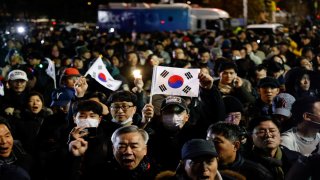
This is CNBC's live blog covering Asia-Pacific markets.
South Korean markets fell Wednesday as pressure mounted on President Yoon Suk Yeol to step down after he imposed and then lifted a martial law decree within hours.
The country's Kospi index dropped 1.44% to end at 2,464, and the Kosdaq fell 1.98% to 677.15, recovering some losses after dropping over 2% earlier in the day.
A coalition of lawmakers from South Korea's opposition parties put forward a bill to impeach Yoon on Wednesday afternoon, according to the spokesperson's office of the main opposition Democracy Party.
Yoon's office said Wednesday that his chief of staff and senior secretaries have offered their resignations.
Amid fears of financial instability, the Bank of Korea said it would boost short-term liquidity and deploy measures to stabilize the FX market as required following an emergency board meeting. It will also make available any special loans needed to inject funds into the market, it added.
Earlier, Yonhap News Agency had reported that country's top financial regulator was ready to deploy 10 trillion won ($7.07 billion) in a stock market stabilization fund at any time to calm market sentiment.
Money Report
Meanwhile, South Korea's foreign exchange authorities are suspected of selling U.S. dollars on the onshore market early Wednesday in efforts to limit declines in the Korean won, two dealers told Reuters.
South Korea 10-year government bond yields snapped 13 days of declines and were last trading at 2.720.
Feeling out of the loop? We'll catch you up on the Chicago news you need to know. Sign up for the weekly> Chicago Catch-Up newsletter.
Other Asia-Pacific markets were trading lower as investors digested events in South Korea.
Japan's Nikkei 225 ended nearly flat at 39,276.39, while the Topix dropped 0.47% to 2,740.6.
Mainland China's CSI 300 fell 0.54% to end trading at 3,930.56. Hong Kong's Hang Seng index was trading down 0.1%, at 19,730 in its final hour of trade.
Investors also assessed GDP data out of Australia, which showed economic growth come in slower than expected in the third quarter, as elevated borrowing costs and sticky inflation continued to weigh on the country.
Australia's S&P/ASX 200 fell 0.38% to end the trading day at 8,462.6.
In the U.S. overnight, South Korean stocks swung wildly amid the political upheaval that rocked the world's 13th-largest economy.
The iShares MSCI South Korea ETF (EWY), which tracks more than 90 large and mid-sized companies in South Korea, tumbled as much as 7% to hit a 52-week low.
Later in the day, the ETF cut losses and closed Tuesday down 1.6% after Yoon said he would lift the emergency declaration following the National Assembly's vote to overturn his martial law decree.
The S&P 500 inched up by 0.05%, while the Nasdaq Composite added 0.4%. Both indexes closed at records. The 30-stock Dow was the laggard, with a decline of nearly 0.2%.
— CNBC's Yun Li and Hakyung Kim contributed to this report.
South Korean may weaken further to 1,450 on the dollar in coming months, strategist says
South Korean won is likely to weaken further to trade at 1,450.0 against the greenback in the coming months, Alvin Tan, head of Asia FX strategy at RBC Capital Markets said in a note on Wednesday, despite the Bank of Korea's efforts to "try to lean against the pressure."
"The domestic political turmoil will aggravate the bearish sentiment swirling around the Korean won, though the growth slowdown and likely U.S.-China trade war next year will continue be the bigger driver," Tan added.
Reuters reported earlier that South Korean financial exchange authorities were suspected of selling U.S. dollars on the onshore market early on Wednesday morning as it attempted to limit declines in the Korean won.
The South Korean won last traded at 1,416.94 on the dollar on Wednesday, recovering from a sharp fall overnight that sent the won to its weakest level since late 2022.
— Anniek Bao
Kospi heavyweight stocks fall in volatile trade after President Yoon’s martial law flip-flop
South Korean heavyweight stocks fell in a volatile trading session Wednesday amid political upheaval that saw President Yoon Suk Yeol reverse a surprise martial law decree that he imposed hours earlier.
Minutes before the markets opened, Kim Byung-hwan, vice-minister of economy and finance, said the regulator was ready to deploy 10 trillion won ($7.07 billion) to stabilize the stock market "at any time," local media Yonhap reported.
South Korean chipmaking giant Samsung Electronics saw shares drop nearly 1% while battery-maker LG Energy Solution and automaker Hyundai Motor experienced wider losses of 2.8% and 2.4%, respectively.
Chip major SK Hynix was marginally lower in choppy trading. Internet giant Naver Corp and battery manufacturer Samsung SDI saw shares sink over 2.5%.
Korea Gas Corporation led the declines in the Kospi index, falling over 14%.
— Anniek Bao
Amid political chaos, Bank of Korea says it will boost short-term liquidity and deploy measures to stabilize the FX market
The Bank of Korea said Wednesday that it would boost short-term liquidity and deploy measures to stabilize the FX market as needed, after South Korean President Yoon Suk Yeol lifted a surprise martial law declaration overnight.
The announcement came shortly after the BOK held an emergency board meeting, which started around 9 a.m. local time. In a statement issued after the meeting, the central bank said it will also make any special loans available to inject funds into the market, if needed.
"As announced together with the government, we will provide sufficient liquidity for a limited time until the financial and foreign exchange markets stabilize," the Bank of Korea said, reiterating a pledge made earlier in the day by South Korea Finance Minister Choi Sang-mok.
Local news agency Yonhap reported earlier Wednesday that South Korea's financial regulator said it is prepared to allocate 10 trillion won ($7.07 billion) to a stock market stabilization fund at any time.
— Lee Ying Shan
President Yoon’s martial law decision was poor and hits South Korea at a bad time: Economist
South Korea's President Yoon Suk Yeol's declaration and later walk back of martial law hits South Korea at a bad time for the economy said Trinh Nguyen, senior economist at Natixis.
Speaking to CNBC's "Squawk Box Asia," Nguyen noted that South Korea's economy was already grappling with weak domestic demand, contracting exports and a downward cycle in its semiconductor market.
"We really need a strong government to have a budget that is fiscally supportive, not just for the short term, but a longer term to deal with a lot of challenges," she said, citing economic troubles in China and potential tariffs from the U.S.
— Dylan Butts
China’s services sector growth slows, Caixin PMI Shows
China's service sector growth slowed in November, according to a Caixin-sponsored survey published Wednesday, as deflationary pressures continue to weigh on the economy.
China's Caixin Services Purchasing Managers' Index (PMI) dropped to 51.5 for the month of November from 52.0 the month prior, according to the survey.
Services business confidence rebounded to its highest level since April, while employment grew for a third successive month.
— Dylan Butts
Australia third-quarter GDP grows at 0.3%, missing expectations
Australia's economy grew at slower-than-expected rate in the third quarter, as elevated borrowing costs and sticky inflation continued to weigh down the slowing economy.
The real gross domestic product rose 0.3% in the three months through September compared with 1% in the previous quarter, according to the Australian Bureau of Statistics said on Wednesday. That also missed the Reuters forecast of a 0.4% jump.
On an annualized basis, Australia's economy rose 0.8%, also missing Reuters estimate of a 1.1% growth, following a 1% rise in the 12 months through the previous quarter.
The country's economy has been on a slowing trend for the past two years, as the Reserve Bank of Australia embarked on a tightening campaign that saw it raise the interest rates by whopping 425 basis points since May 2022.
— Anniek Bao
Bank of Korea holds emergency meeting after Yoon lifts martial law
The Bank of Korea is holding an emergency meeting after South Korean President Yoon Suk Yeol lifted a surprise martial law declaration overnight.
The central bank was set to convene an extraordinary board meeting at around 9 a.m. local time on Wednesday. Last week, the BOK cut its benchmark interest rate by 25 basis points in a surprise move.
Around that time, local news agency Yonhap reported that South Korea's regulator financial regulator said it is prepared to allocate 10 trillion won ($7.07 billion) to a stock market stabilization fund any time.
Read the full story here.
—Lee Ying Shan
CNBC Pro: 'We really like the U.S.' Julius Baer portfolio manager says. Here's where she sees opportunity
At a time when investors are mixed on the U.S. market, one portfolio manager remains optimistic and sees reason to stay invested over the longer-term.
"We really like the U.S. Now that the election result is clear and behind us, we can reasonably assume a higher growth rate in the U.S., and that's probably going to lead to an end of year rally," Aneka Beneby, portfolio manager at Julius Baer International said, revealing segments she sees opportunities in.
CNBC Pro subscribers can read more here.
— Amala Balakrishner
CNBC Pro: How are investors trading France’s political chaos?
The French government is on the brink of collapse this week and investors are gearing up for a volatile week of trading, with some eyeing opportunities amid the chaos.
Investors have shared how they're trading French bonds and laid out what could happen if the government falls, and other scenarios.
CNBC Pro subscribers can read more here.
— Ganesh Rao
S&P 500, Nasdaq close at fresh record highs
The S&P 500 and Nasdaq Composite closed at new records on Tuesday.
The broad market index advanced 0.05% to close at 6,049.88, and the tech-heavy Nasdaq gained 0.4% to close at 19,480.91. Meanwhile, the blue-chip Dow Jones Industrial Average slid 76.47 points, or 0.17%, to finish at 44,705.53.
— Sean Conlon
EWY shares fall as South Korean president declares martial law

The iShares MSCI South Korea ETF (EWY) slipped more than 4% on Tuesday, after President Yoon Suk Yeol accused the country's opposition party of controlling parliament and supporting North Korea.
President Yoon Suk Yeol declared an "emergency martial law," and said he would "eradicate pro-North Korean forces and protect the constitutional democratic order."
— Brian Evans
Korean won tumbles against greenback
The Korean won weakened 1.2% against the dollar to its lowest level in two years on the news that South Korean President Yoon Suk Yeol declared "emergency martial law" on Tuesday.
The dollar last traded at 1,421.29 won.
— Hakyung Kim






